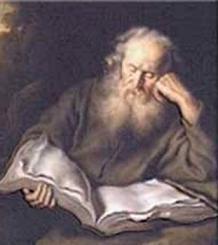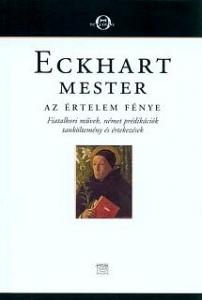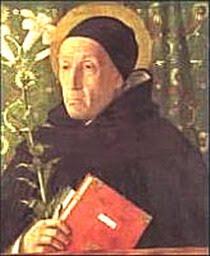The Way to God
You need to read much to see how little you know.
- Lia Chin
As the book's preface states, Meister Eckhart is known in a lot of ways; viewed as either a great mystic, a theologist, a reformer of the German language or a philosopher, his influence is unquestionable. After reading his works, you realise you need to grow to understand him.
Meister Eckhart wrote in Latin and German. He is of German origin although as a Dominican, he studied in Paris, at whose university he later became professor on two occasions - just like his most famous fellow Dominican, Thomas Aquinas. In reality, very little is known about Eckhart's life. He was born around 1260 in Hochheim where he probably spent his early years. He held many major clerical positions (provost, vicar) while also being the deputy of the order general. His teachings were viewed dubious as a result of which he was sued. He died presumably in Cologne, in 1328, before the end of the legal proceedings.

Eckhart's greatest work is "Opus tripartium" whose modern edition hasn't been published yet. Although Eckhart is considered one of the greats of medieval mysticism his teachings were influenced by many outside trends. His philosophies remind of Neoplatonic wisdom and there are also traces of various Oriental philosophies in Eckhart's thinking, eg. Zen and Sankhara. Eckhart's teachings show probably the strongest similarities with the works of Plotinus and Pseudo-Dionysius. While studying in Paris, Eckhart got to know the works of well-known authors like Thomas Aquinas and Saint Augustine. He also studied and translated works written by Saint Victorian theologists. These and other authors and their works greatly influenced Eckhart. Of course, his oeuvre outlived him. His followers include Johannes Tauler, Heinrich Seuse, some of his theories influenced Causanus and even Arthur Schopenhauer was deeply affected by certain notions.
This 2010 book, published by Kairosz, contains Eckhart's works in chronological order. The date of the first one is 1293 while the last one is from approximately 1326, which means the volume includes texts from all of the author's life of work.

The element that connects the pieces of the collection (beyond the author of course) is their topic. All of them are lectures or teachings that deal with the idea of moral living, the question of virtues and the relations of man and God. The basis of all of the works is a kind of teaching, educational purpose. This is what firmly ties these pieces together. All of them 'aim' at teaching the reader to get closer to God, approaching with respect, in a way that later allows them to fully reach him. Some of the works, for example the first one, titled "A Dissertation on the Prayer to God", helps the faithful by offering an explanation to certain religious matters. (In this case it shows the significance of every single word in "The Lord's Prayer". "Guiding Speeches", a collatio created between 1294 and 1298 has a personal tone, describing the rules of living like a devoted Christian. Almost uniquely, it deals with the practical questions of Christian spiritual life. In the last piece, "The Noble Man" from 1325, Eckhart teaches the reader how to become a 'man of the Book', that is, letting go of material concerns and finding God. These are the kinds of teachings you will find when you open "The Light of Reason".
Present-day people might not find this life-like at first but you have to discover the spirituality in it. Reading these works, you might think that not only does Eckhart view Christianity as a religion but also a duty with many 'rules'. However, he also suggests that accepting and completing these 'duties' or 'trials' that is necessary for living a true Christian life, you do have a place next to God. In a way, this reminds of self-redeeming religions (eg. Gnosticism), but you mustn't forget that in case of Eckhart, all roads lead to God in the end as the final goal and although people do have a role in redeeming themselves and their souls, it is unimaginable without God.

Eckhart's style is rich in metaphors and similes. It is rhetorical and even artistic in certain spots. However, just like this special style, the numerous philosophical and literary aspects can cause difficulties. To better understand Eckhart's works, it is useful to be thoroughly familiar with the Bible as well as Thomas Aquinas' oeuvre. The fact that the book contains a biography including the description of the author's work and his inspirations makes your job easier and, as always, the footnotes are also very helpful. Naturally, the emphasis is on the works cited and in some cases, it is almost imperative to look up the secondary sources in order to properly understand the text. Also helping the reader are the 'comments' made by the editor/translator. These can be found preceding the actual texts, and in some cases it is worth referring back to them while reading. Although these are only assisting sets of 'data' that do not offer a clear-cut interpretation, Eckhart's works are ideas to ruminate on which require frequent and deep consideration and contemplation. Objective knowledge is only a part of this, meaning that no summary, how ever well-written it may be, can be the key to absolutely grasping the author's thoughts.
Maybe this is exactly where the beauty of the Eckhartian texts originates from. Having lived 800 years before you, this thinker guides you to a different dimension. You need to break away from today to be able to appreciate, enjoy and use these works. Instead of the troubled, fast and hectic everyday life, here, you'll find a kind of stability, an eternal wisdom.
Meister Eckhart, Az értelem fénye. Fiatalkori művek, német prédikációk, tanköltemény és értekezés. Budapest, Kairosz, 2010. Translated by Ferenc Bányai.



Facebook-hozzászólások